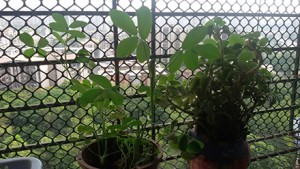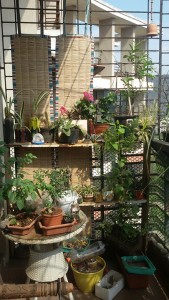 Have you ever thought about how much household waste we generate in a day? According to a report, individual middle-class residents in big cities generate nearly 0.8 kg of waste per day. Out of which 60% or more of the daily waste generated in households is made up of organic matter. Composting is the best way to handle your food waste. You can convert your daily dustbin contents into rich, organic manure and grow flowers, vegetables or plants with it, says Chhaya Taralekar, a resident of Navi Mumbai.
Have you ever thought about how much household waste we generate in a day? According to a report, individual middle-class residents in big cities generate nearly 0.8 kg of waste per day. Out of which 60% or more of the daily waste generated in households is made up of organic matter. Composting is the best way to handle your food waste. You can convert your daily dustbin contents into rich, organic manure and grow flowers, vegetables or plants with it, says Chhaya Taralekar, a resident of Navi Mumbai.
The idea of converting food waste into organic matter came up when Taralekar was in Libya. “When we were in Tripoli, Libya, it was difficult to get fresh Indian coriander, green vegetables like methi etc. in the local market because of the civil unrest. Being Indians we are very fond of using these fresh green leaves in our daily food. One day I decided to try to make dry compost by utilizing kitchen organic waste. Our house had four balconies with five hours of sunlight which was enough to dry the kitchen waste. I used covered vessels which were open from top and were porous from bottom. The methane gas evolving from this waste used to dry it faster,” says Chhaya.
“I started sorting kitchen waste and deliberately left out onion and garlic peals as they generally take longer to decompose. It took almost 20 days for the collection of one month’s kitchen waste to get dried and convert into compost. “On these dried compost I sprinkled water for about eight days. The colour of the compost started to change to black as decomposition started. After drying for further two days I used this as a compost and spread on top of sand bed. I utilized the old plastic bottles for this experiment. I made holes in the bottom so that there should not be any stagnant water. I then put the soaked and previously sprouted methi seeds on the top of sand bed mixed with the above compost”, she informs.
Within no time the methi seeds sprouted. “It was amazing to see the cut plastic bottle were full of methi crops. I watered plants every morning in a delicate way and I realized kitchen waste can be converted in to a valuable Gold- the precious organic compost. Same way I tried for coriander crop out of dhania seeds and the result was amazing”, beamingly says Chhaya.
Today, Chhaya grows a lot of plants totally on organic fertilizer such as Cocasia, methi, wheat grass, lemongrass, ajwain, garlic, ginger, ambe haladi (turmeric ) in the balcony of her apartment.
A very positive person by nature, Chhaya says there are many merits in having a compost pit at home. “The garbage decomposes slowly and provides nutrients to home garden. The plants are healthy and lush green,” she asserts.
Quashing the myth that people living in ground floor houses can only make compost pit she says, “Abundant sunlight is everywhere so if anyone has balcony with little sunlight, airy place and the willingness to implement it, compost pit can be created anywhere. Whole family can be involved into these procedures to utilise kitchen waste. It takes hardly ten minutes to cut it into small pieces and put it in the compost pit. It is not rocket science. Only everyone has to keep in mind that kitchen waste must be crisp dry before we use it as compost. Nature has answers to the right way of converting “Garbage in to Gold” with help of sunlight,” she says with a smile.
“If everyone makes compost pit – it will be a perfect gift of Nature. My home grown plants are very healthy and I am Happy and content,” she adds.
 Following are the steps to make compost at home:
Following are the steps to make compost at home:
Compost can be made using waste plastic bucket also. Only it should be porous from bottom to drain excess water and to release Methane gas slowly.
Segregate your household waste into dry and wetright in your kitchen. Fruit peels, teabags and leftovers of food are wet waste, while paper, plastic and packaging are dry waste.
Put the wet and dry waste in two different containers in the kitchen.
Once the wet waste container is full, put its contents into the compost pot.
Add dried leaves of the same quantity as the waste. Turn the pile around every other day.
The pile has to be kept at the right level of dampness. If it is too wet, add dried leaves and stir. If it is too dry, add water and stir. Once full, leave the pot open for 3045 days for the composting to happen.
Once the container is full, move the semi-composted matter into a larger container or bin.
After two months, the waste will turn into rich compost that can be used or sold as manure.
Note: Do not add cooked food, meat and dairy products, at least in the beginning, to avoid a stench.













